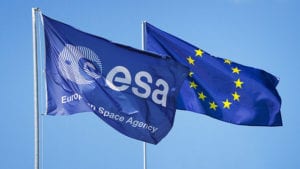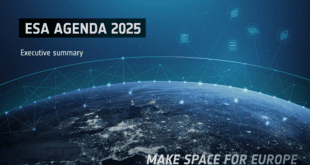 As part of the partnership between SpaceWatch.Global and the European Space Policy Institute, we have been granted permission to publish selected articles and briefs. This is ESPI Briefs No. 33: ‘EU-ESA Space Council Revival: First step toward a European Space Council?’, originally published in June 2019.
As part of the partnership between SpaceWatch.Global and the European Space Policy Institute, we have been granted permission to publish selected articles and briefs. This is ESPI Briefs No. 33: ‘EU-ESA Space Council Revival: First step toward a European Space Council?’, originally published in June 2019.
1. Revival of the EU-ESA Space Council after an 8-year hiatus
 On May 28th 2019, in the margins of the Competitiveness Council (COMPET), the EU-ESA Space Council held its 9th meeting. This high-level, policy-oriented forum was initiated in 2004 with the objective to deepen coordination of space activities between the European Space Agency and the European Union. The last edition of this event took place more than 7 years ago on December 6th 2011. The Romanian Presidency of the EU deemed useful to revive it in the current context where major decisions related to the next MFF (Multi-annual Financial Framework of the EU) and the upcoming Space19+ (next ESA Council at Ministerial Level) are impacting the institutional framework of the European space sector.
On May 28th 2019, in the margins of the Competitiveness Council (COMPET), the EU-ESA Space Council held its 9th meeting. This high-level, policy-oriented forum was initiated in 2004 with the objective to deepen coordination of space activities between the European Space Agency and the European Union. The last edition of this event took place more than 7 years ago on December 6th 2011. The Romanian Presidency of the EU deemed useful to revive it in the current context where major decisions related to the next MFF (Multi-annual Financial Framework of the EU) and the upcoming Space19+ (next ESA Council at Ministerial Level) are impacting the institutional framework of the European space sector.
This meeting brought to the roundtable leaders of the Competitiveness Council, joined, for this occasion by Canadian, Norwegian and Swiss ministerial delegations, as well as executives from ESA and the European Commission. The primary agenda item of this informal meeting was to encourage both institutions to step further into their respective space activities and programmes with the objective to “strengthen Europe’s role as a global actor and promote international cooperation in the field of space.”
2. Reaffirmation of rising stakes for Europe in space and of the necessity for an ambitious long-term vision based on cooperation
The main outcome of the event is the adoption of the resolution ‘Space as an Enabler’. It is a joint statement confirming key priorities of Europe’s space policies. Due to various constraints, the initial ambition to draft a common text for the two organisations could not be achieved and separate ad-hoc documents – EU Council Conclusions and ESA Resolution – were respectively issued by the two organisations, with identical text.
One of the key features of the document is the reference to the emergence of New Space trends, both in the upstream and the downstream, that profoundly transformed the global space landscape. In this regard, the need to strengthen the competitiveness of the European space industry is stressed, but more broadly, the space sector is deemed likely to “offer new opportunities for enhancing competitiveness, innovation and entrepreneurship of the European economy”. The document also reiterates “the strategic importance of independent access to space”, as well as the multiple contributions of space critical infrastructures to various societal challenges and European public policies including Security and Defence.
The resolution also makes a vibrant call for greater coordination. It encourages European stakeholders to avoid any unnecessary duplication of efforts and to promote a coherent and persistent implementation of activities in order to maximize socio-economic benefits of public investments, to enhance competitiveness of industry and to foster the position of Europe as a space power. As ESA’s Director Johann-Dietrich Wörner put it after the meeting: “competition is a driver, cooperation is an enabler,” in the European space sector.
Finally, to better ensure a strategic vision, the document recommends the adoption of ambitious space policy objectives along with necessary resources.
3. Promising achievement in a complex European space policy landscape
The Romanian Presidency of the EU has been the main driving force behind the revival of the EU-ESA Space Council, working hand in hand with the Spanish Presidency of ESA and with the support of the Agency and the European Commission. Although the results may seem underwhelming in light of the increasingly serious challenges that Europe faces in the space sector, the successful organisation of this event is an important achievement of the Romanian Presidency.
With two major debates for the future of Europe in space already on-going (EU resolution and ESA Space19+), reaching important decisions on key space policy topics was certainly not the objective of this edition of the Council. Notwithstanding, the resolution recalls that “a long-term consolidated strategic vision […] is needed in order to build up a stronger space sector and to increase the influence of Europe on the global stage” and encourages “the organisation of the Space Council on a regular basis […] to discuss the common European strategic vision and goals for space.” From this perspective, the event could very well become a stepping-stone in Europe’s effort to define such shared vison for the future of its space sector.
4. Toward a European Space Council?

ESPI previously explored in its Brief 29 the idea suggested by Ms Elżbieta Bieńkowska, to establish a formal European Space Council. The brief argued that, in a context of profound sectoral and geopolitical changes, such arrangement would better mirror the importance awarded to the space sector by other major space powers and would support the definition of an ambitious European space vision, at the highest political level, based on decisive principles with far-reaching and long-term implications. The revival of the EU-ESA Space Council could be a first step in this direction provided that:
The role of the Council evolves in line with the substantial developments of the European space institutional set-up since 2004. Initially created to “pave the way for a European Space Programme” and then to “improve coordination between the EU and ESA”, the Council could further be envisioned as an appropriate body to “lead and direct European space policies and activities toward a shared vision”.
Since the challenge of building up a Europe-wide consensus on an ambitious agenda shall remain the privilege of Member States, the Council could focus on defining a political approach to space, accounting for overarching issues and concerns for Europe reaching beyond the strict space sector: for instance, Security & Defence and International Affairs, that set the boundary conditions of the European Space Strategy.
The 9th edition of EU-ESA Space Council was concluded by the commitment of Germany to organise the next edition during its own presidency of the EU. Ideally positioned in the 2nd semester of 2020, such Council meeting could define and initiate the process towards a new common and ambitious space strategy.
Rights reserved – this publication is reproduced with permission from ESPI. “Source: ESPI “ESPI Briefs” No. 33, June 2019. All rights reserved”
For more articles please visit ESPI website (www.espi.or.at).




